EDUC7053 - Review of Literature & Mini Essay: Global Education
VerifiedAdded on 2023/01/13
|12
|2916
|55
Report
AI Summary
This report presents a comprehensive review of literature and a mini-essay focusing on the impact of globalization on educational policies, particularly in developing countries. The literature review analyzes three key papers: Al’Abri (2011), discussing globalization's impact on Oman's education; Christie (2008), examining the role of education in a globalized world, with a focus on Africa; and Santos (2006), exploring globalization from a counter-hegemonic perspective. The review compares the papers' methodologies, findings, and perspectives on globalization's influence on education. The mini-essay synthesizes the key themes, arguing that globalization reshapes educational policies, necessitating adjustments to prepare students for a globalized world. It highlights the need for countries to adapt their education systems to meet the challenges and opportunities presented by globalization, emphasizing the importance of education in promoting global integration and economic development. The assignment draws on academic articles and book chapters to provide a detailed analysis of the subject matter.
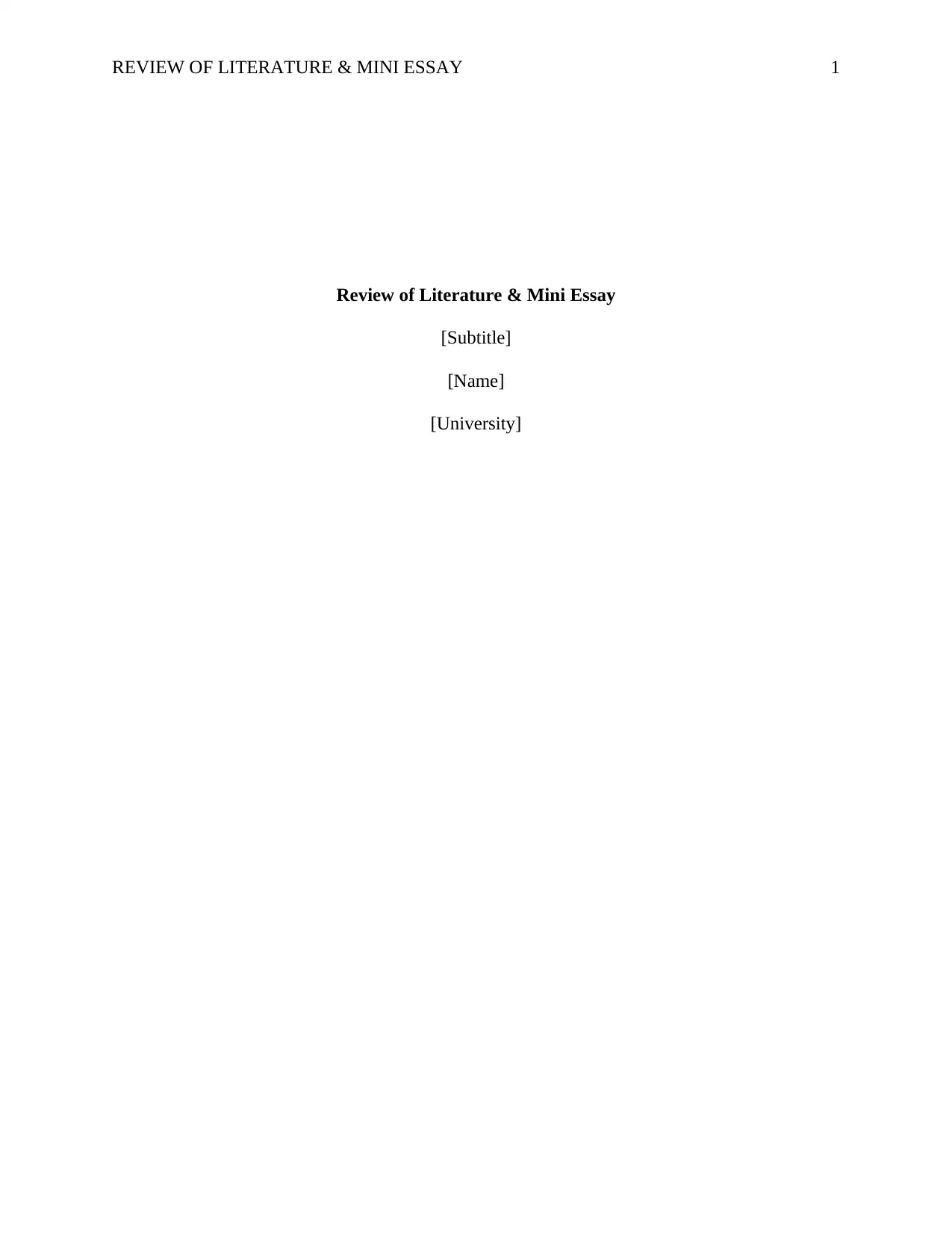
REVIEW OF LITERATURE & MINI ESSAY 1
Review of Literature & Mini Essay
[Subtitle]
[Name]
[University]
Review of Literature & Mini Essay
[Subtitle]
[Name]
[University]
Paraphrase This Document
Need a fresh take? Get an instant paraphrase of this document with our AI Paraphraser
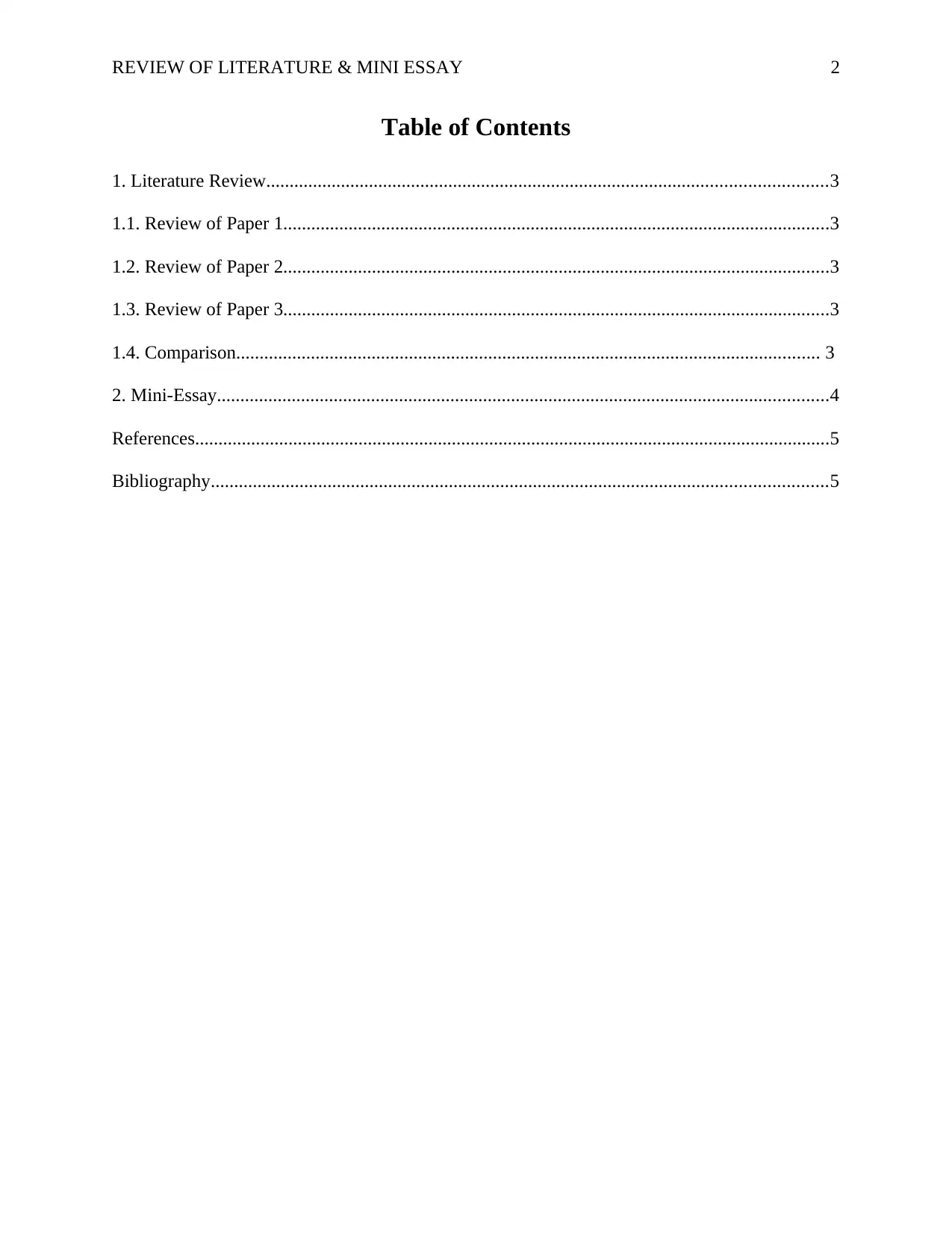
REVIEW OF LITERATURE & MINI ESSAY 2
Table of Contents
1. Literature Review........................................................................................................................3
1.1. Review of Paper 1.....................................................................................................................3
1.2. Review of Paper 2.....................................................................................................................3
1.3. Review of Paper 3.....................................................................................................................3
1.4. Comparison............................................................................................................................. 3
2. Mini-Essay...................................................................................................................................4
References........................................................................................................................................5
Bibliography....................................................................................................................................5
Table of Contents
1. Literature Review........................................................................................................................3
1.1. Review of Paper 1.....................................................................................................................3
1.2. Review of Paper 2.....................................................................................................................3
1.3. Review of Paper 3.....................................................................................................................3
1.4. Comparison............................................................................................................................. 3
2. Mini-Essay...................................................................................................................................4
References........................................................................................................................................5
Bibliography....................................................................................................................................5
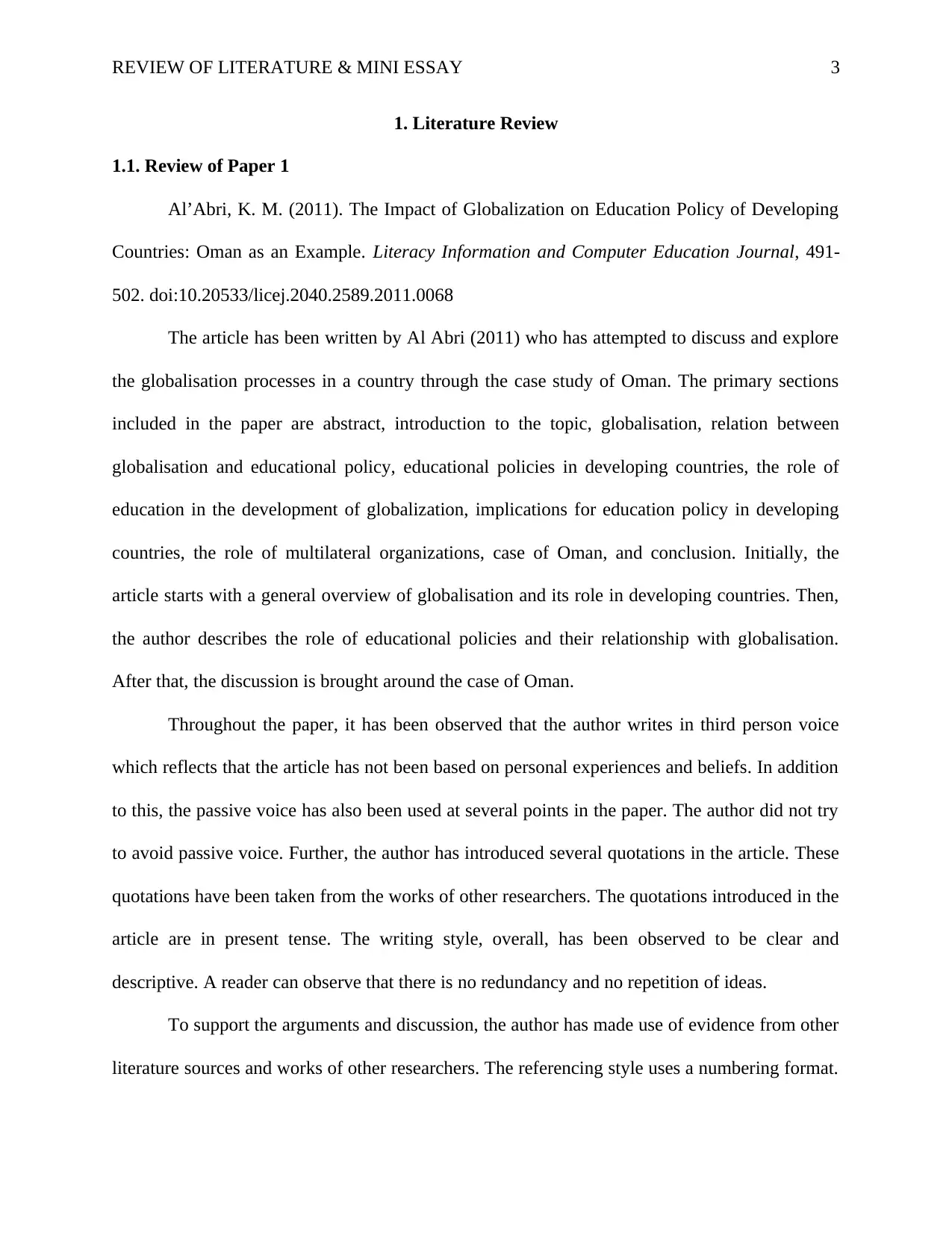
REVIEW OF LITERATURE & MINI ESSAY 3
1. Literature Review
1.1. Review of Paper 1
Al’Abri, K. M. (2011). The Impact of Globalization on Education Policy of Developing
Countries: Oman as an Example. Literacy Information and Computer Education Journal, 491-
502. doi:10.20533/licej.2040.2589.2011.0068
The article has been written by Al Abri (2011) who has attempted to discuss and explore
the globalisation processes in a country through the case study of Oman. The primary sections
included in the paper are abstract, introduction to the topic, globalisation, relation between
globalisation and educational policy, educational policies in developing countries, the role of
education in the development of globalization, implications for education policy in developing
countries, the role of multilateral organizations, case of Oman, and conclusion. Initially, the
article starts with a general overview of globalisation and its role in developing countries. Then,
the author describes the role of educational policies and their relationship with globalisation.
After that, the discussion is brought around the case of Oman.
Throughout the paper, it has been observed that the author writes in third person voice
which reflects that the article has not been based on personal experiences and beliefs. In addition
to this, the passive voice has also been used at several points in the paper. The author did not try
to avoid passive voice. Further, the author has introduced several quotations in the article. These
quotations have been taken from the works of other researchers. The quotations introduced in the
article are in present tense. The writing style, overall, has been observed to be clear and
descriptive. A reader can observe that there is no redundancy and no repetition of ideas.
To support the arguments and discussion, the author has made use of evidence from other
literature sources and works of other researchers. The referencing style uses a numbering format.
1. Literature Review
1.1. Review of Paper 1
Al’Abri, K. M. (2011). The Impact of Globalization on Education Policy of Developing
Countries: Oman as an Example. Literacy Information and Computer Education Journal, 491-
502. doi:10.20533/licej.2040.2589.2011.0068
The article has been written by Al Abri (2011) who has attempted to discuss and explore
the globalisation processes in a country through the case study of Oman. The primary sections
included in the paper are abstract, introduction to the topic, globalisation, relation between
globalisation and educational policy, educational policies in developing countries, the role of
education in the development of globalization, implications for education policy in developing
countries, the role of multilateral organizations, case of Oman, and conclusion. Initially, the
article starts with a general overview of globalisation and its role in developing countries. Then,
the author describes the role of educational policies and their relationship with globalisation.
After that, the discussion is brought around the case of Oman.
Throughout the paper, it has been observed that the author writes in third person voice
which reflects that the article has not been based on personal experiences and beliefs. In addition
to this, the passive voice has also been used at several points in the paper. The author did not try
to avoid passive voice. Further, the author has introduced several quotations in the article. These
quotations have been taken from the works of other researchers. The quotations introduced in the
article are in present tense. The writing style, overall, has been observed to be clear and
descriptive. A reader can observe that there is no redundancy and no repetition of ideas.
To support the arguments and discussion, the author has made use of evidence from other
literature sources and works of other researchers. The referencing style uses a numbering format.
⊘ This is a preview!⊘
Do you want full access?
Subscribe today to unlock all pages.

Trusted by 1+ million students worldwide
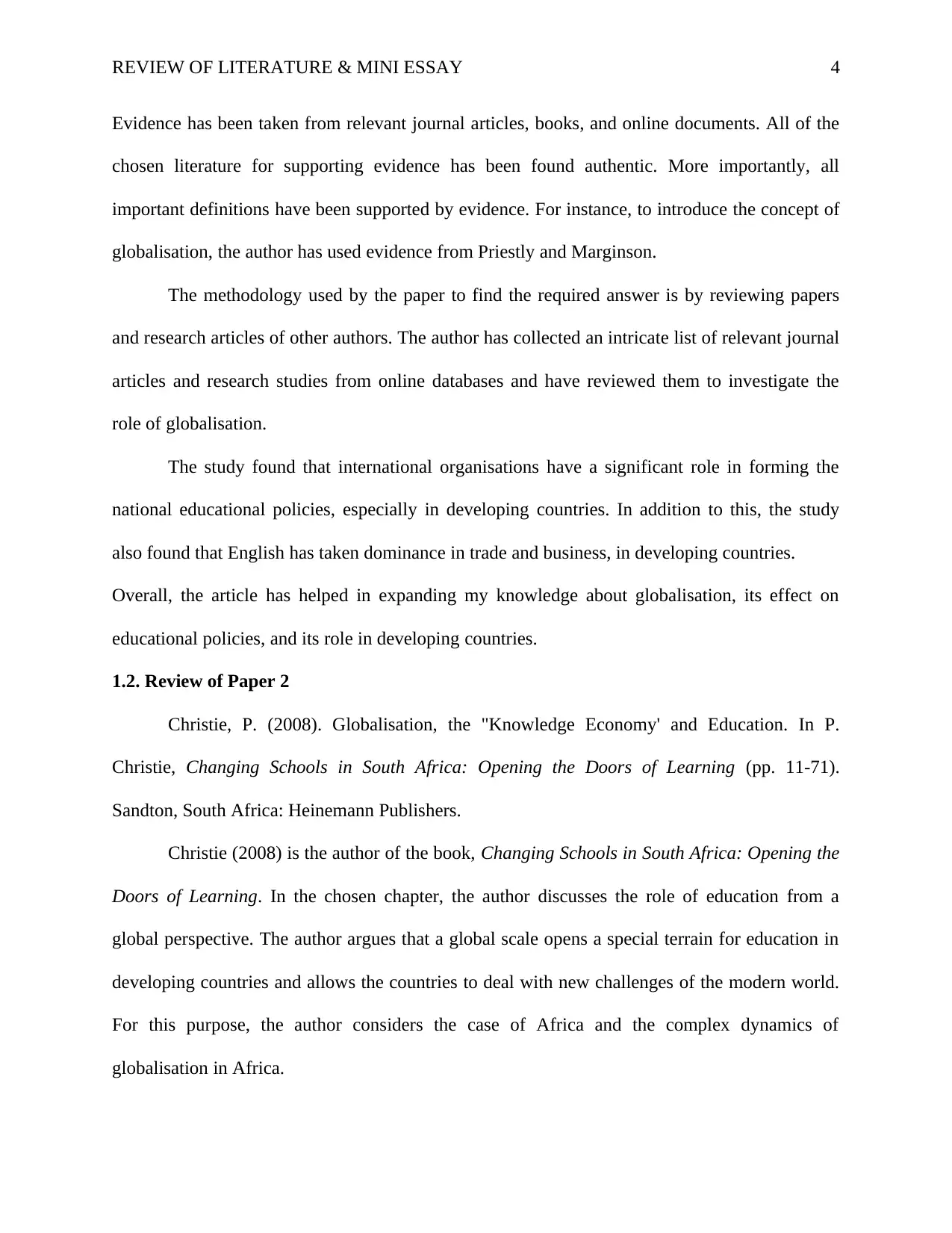
REVIEW OF LITERATURE & MINI ESSAY 4
Evidence has been taken from relevant journal articles, books, and online documents. All of the
chosen literature for supporting evidence has been found authentic. More importantly, all
important definitions have been supported by evidence. For instance, to introduce the concept of
globalisation, the author has used evidence from Priestly and Marginson.
The methodology used by the paper to find the required answer is by reviewing papers
and research articles of other authors. The author has collected an intricate list of relevant journal
articles and research studies from online databases and have reviewed them to investigate the
role of globalisation.
The study found that international organisations have a significant role in forming the
national educational policies, especially in developing countries. In addition to this, the study
also found that English has taken dominance in trade and business, in developing countries.
Overall, the article has helped in expanding my knowledge about globalisation, its effect on
educational policies, and its role in developing countries.
1.2. Review of Paper 2
Christie, P. (2008). Globalisation, the "Knowledge Economy' and Education. In P.
Christie, Changing Schools in South Africa: Opening the Doors of Learning (pp. 11-71).
Sandton, South Africa: Heinemann Publishers.
Christie (2008) is the author of the book, Changing Schools in South Africa: Opening the
Doors of Learning. In the chosen chapter, the author discusses the role of education from a
global perspective. The author argues that a global scale opens a special terrain for education in
developing countries and allows the countries to deal with new challenges of the modern world.
For this purpose, the author considers the case of Africa and the complex dynamics of
globalisation in Africa.
Evidence has been taken from relevant journal articles, books, and online documents. All of the
chosen literature for supporting evidence has been found authentic. More importantly, all
important definitions have been supported by evidence. For instance, to introduce the concept of
globalisation, the author has used evidence from Priestly and Marginson.
The methodology used by the paper to find the required answer is by reviewing papers
and research articles of other authors. The author has collected an intricate list of relevant journal
articles and research studies from online databases and have reviewed them to investigate the
role of globalisation.
The study found that international organisations have a significant role in forming the
national educational policies, especially in developing countries. In addition to this, the study
also found that English has taken dominance in trade and business, in developing countries.
Overall, the article has helped in expanding my knowledge about globalisation, its effect on
educational policies, and its role in developing countries.
1.2. Review of Paper 2
Christie, P. (2008). Globalisation, the "Knowledge Economy' and Education. In P.
Christie, Changing Schools in South Africa: Opening the Doors of Learning (pp. 11-71).
Sandton, South Africa: Heinemann Publishers.
Christie (2008) is the author of the book, Changing Schools in South Africa: Opening the
Doors of Learning. In the chosen chapter, the author discusses the role of education from a
global perspective. The author argues that a global scale opens a special terrain for education in
developing countries and allows the countries to deal with new challenges of the modern world.
For this purpose, the author considers the case of Africa and the complex dynamics of
globalisation in Africa.
Paraphrase This Document
Need a fresh take? Get an instant paraphrase of this document with our AI Paraphraser
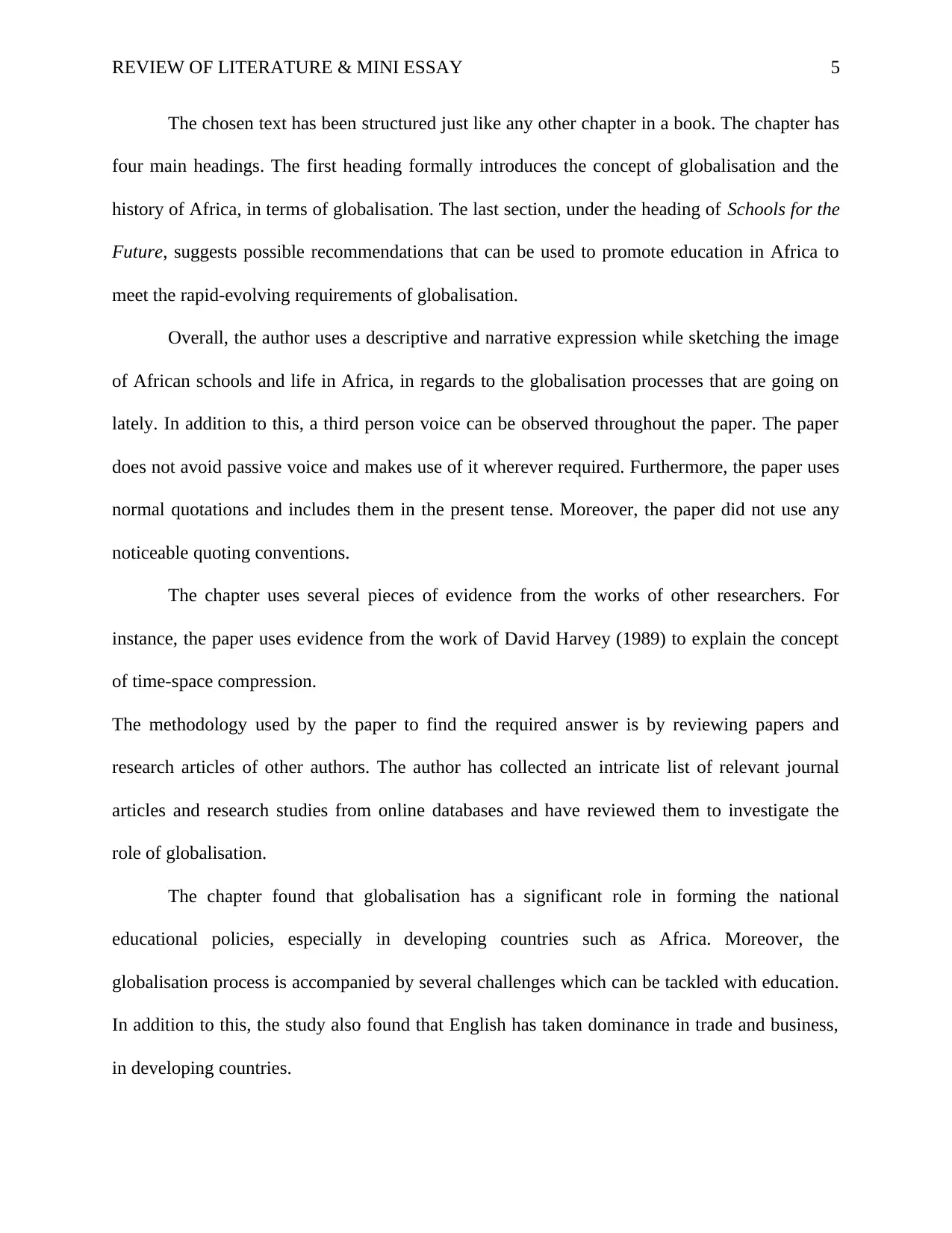
REVIEW OF LITERATURE & MINI ESSAY 5
The chosen text has been structured just like any other chapter in a book. The chapter has
four main headings. The first heading formally introduces the concept of globalisation and the
history of Africa, in terms of globalisation. The last section, under the heading of Schools for the
Future, suggests possible recommendations that can be used to promote education in Africa to
meet the rapid-evolving requirements of globalisation.
Overall, the author uses a descriptive and narrative expression while sketching the image
of African schools and life in Africa, in regards to the globalisation processes that are going on
lately. In addition to this, a third person voice can be observed throughout the paper. The paper
does not avoid passive voice and makes use of it wherever required. Furthermore, the paper uses
normal quotations and includes them in the present tense. Moreover, the paper did not use any
noticeable quoting conventions.
The chapter uses several pieces of evidence from the works of other researchers. For
instance, the paper uses evidence from the work of David Harvey (1989) to explain the concept
of time-space compression.
The methodology used by the paper to find the required answer is by reviewing papers and
research articles of other authors. The author has collected an intricate list of relevant journal
articles and research studies from online databases and have reviewed them to investigate the
role of globalisation.
The chapter found that globalisation has a significant role in forming the national
educational policies, especially in developing countries such as Africa. Moreover, the
globalisation process is accompanied by several challenges which can be tackled with education.
In addition to this, the study also found that English has taken dominance in trade and business,
in developing countries.
The chosen text has been structured just like any other chapter in a book. The chapter has
four main headings. The first heading formally introduces the concept of globalisation and the
history of Africa, in terms of globalisation. The last section, under the heading of Schools for the
Future, suggests possible recommendations that can be used to promote education in Africa to
meet the rapid-evolving requirements of globalisation.
Overall, the author uses a descriptive and narrative expression while sketching the image
of African schools and life in Africa, in regards to the globalisation processes that are going on
lately. In addition to this, a third person voice can be observed throughout the paper. The paper
does not avoid passive voice and makes use of it wherever required. Furthermore, the paper uses
normal quotations and includes them in the present tense. Moreover, the paper did not use any
noticeable quoting conventions.
The chapter uses several pieces of evidence from the works of other researchers. For
instance, the paper uses evidence from the work of David Harvey (1989) to explain the concept
of time-space compression.
The methodology used by the paper to find the required answer is by reviewing papers and
research articles of other authors. The author has collected an intricate list of relevant journal
articles and research studies from online databases and have reviewed them to investigate the
role of globalisation.
The chapter found that globalisation has a significant role in forming the national
educational policies, especially in developing countries such as Africa. Moreover, the
globalisation process is accompanied by several challenges which can be tackled with education.
In addition to this, the study also found that English has taken dominance in trade and business,
in developing countries.
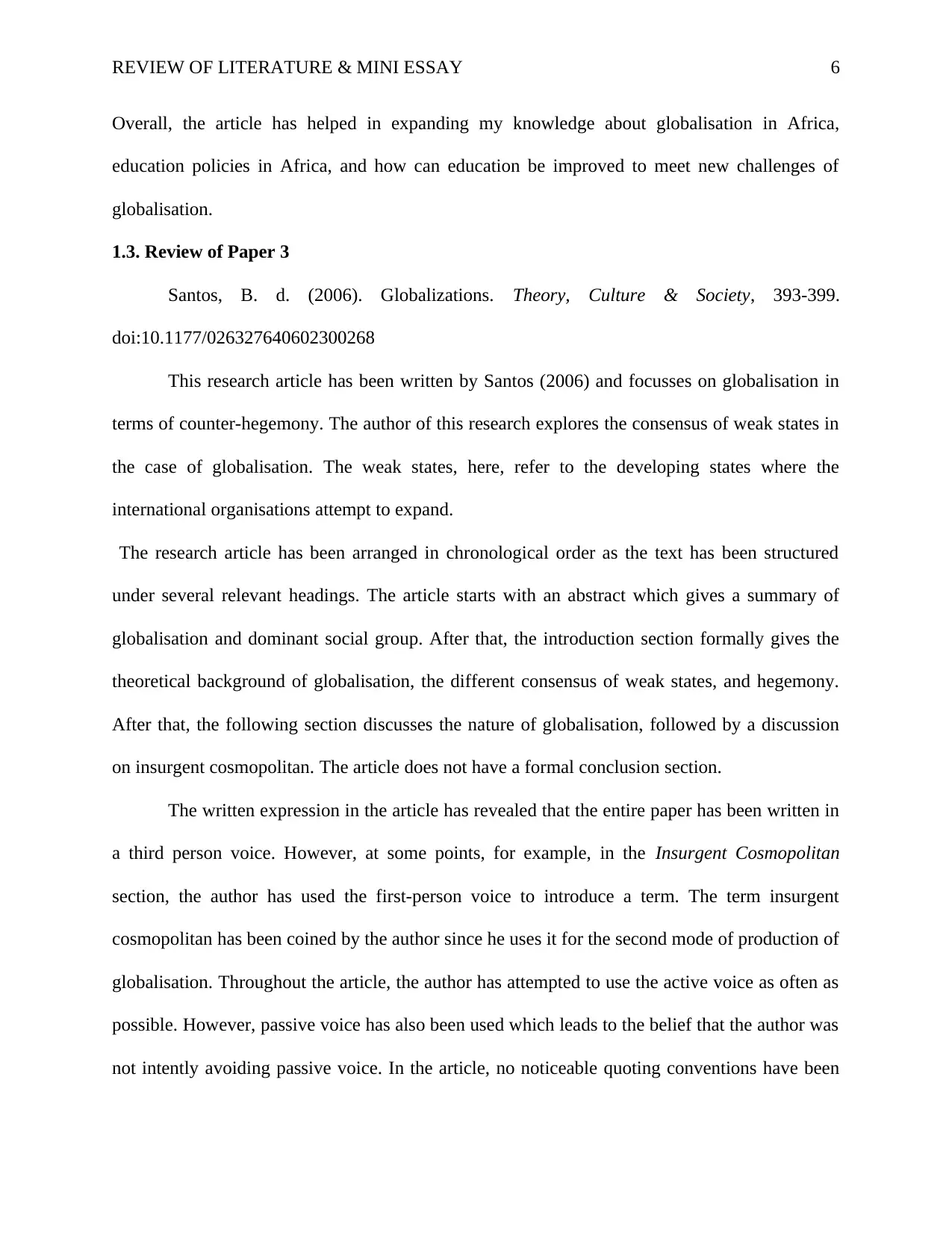
REVIEW OF LITERATURE & MINI ESSAY 6
Overall, the article has helped in expanding my knowledge about globalisation in Africa,
education policies in Africa, and how can education be improved to meet new challenges of
globalisation.
1.3. Review of Paper 3
Santos, B. d. (2006). Globalizations. Theory, Culture & Society, 393-399.
doi:10.1177/026327640602300268
This research article has been written by Santos (2006) and focusses on globalisation in
terms of counter-hegemony. The author of this research explores the consensus of weak states in
the case of globalisation. The weak states, here, refer to the developing states where the
international organisations attempt to expand.
The research article has been arranged in chronological order as the text has been structured
under several relevant headings. The article starts with an abstract which gives a summary of
globalisation and dominant social group. After that, the introduction section formally gives the
theoretical background of globalisation, the different consensus of weak states, and hegemony.
After that, the following section discusses the nature of globalisation, followed by a discussion
on insurgent cosmopolitan. The article does not have a formal conclusion section.
The written expression in the article has revealed that the entire paper has been written in
a third person voice. However, at some points, for example, in the Insurgent Cosmopolitan
section, the author has used the first-person voice to introduce a term. The term insurgent
cosmopolitan has been coined by the author since he uses it for the second mode of production of
globalisation. Throughout the article, the author has attempted to use the active voice as often as
possible. However, passive voice has also been used which leads to the belief that the author was
not intently avoiding passive voice. In the article, no noticeable quoting conventions have been
Overall, the article has helped in expanding my knowledge about globalisation in Africa,
education policies in Africa, and how can education be improved to meet new challenges of
globalisation.
1.3. Review of Paper 3
Santos, B. d. (2006). Globalizations. Theory, Culture & Society, 393-399.
doi:10.1177/026327640602300268
This research article has been written by Santos (2006) and focusses on globalisation in
terms of counter-hegemony. The author of this research explores the consensus of weak states in
the case of globalisation. The weak states, here, refer to the developing states where the
international organisations attempt to expand.
The research article has been arranged in chronological order as the text has been structured
under several relevant headings. The article starts with an abstract which gives a summary of
globalisation and dominant social group. After that, the introduction section formally gives the
theoretical background of globalisation, the different consensus of weak states, and hegemony.
After that, the following section discusses the nature of globalisation, followed by a discussion
on insurgent cosmopolitan. The article does not have a formal conclusion section.
The written expression in the article has revealed that the entire paper has been written in
a third person voice. However, at some points, for example, in the Insurgent Cosmopolitan
section, the author has used the first-person voice to introduce a term. The term insurgent
cosmopolitan has been coined by the author since he uses it for the second mode of production of
globalisation. Throughout the article, the author has attempted to use the active voice as often as
possible. However, passive voice has also been used which leads to the belief that the author was
not intently avoiding passive voice. In the article, no noticeable quoting conventions have been
⊘ This is a preview!⊘
Do you want full access?
Subscribe today to unlock all pages.

Trusted by 1+ million students worldwide
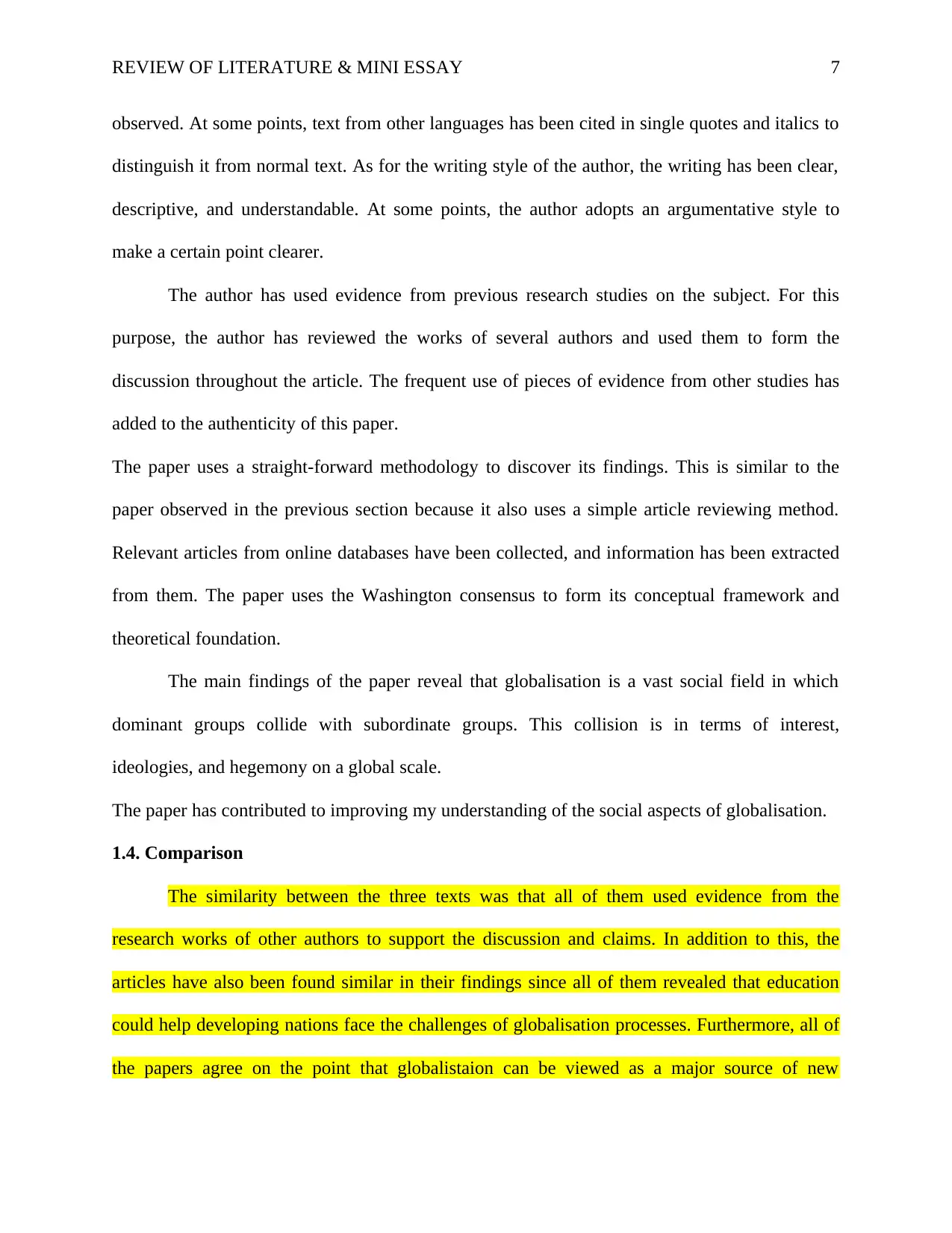
REVIEW OF LITERATURE & MINI ESSAY 7
observed. At some points, text from other languages has been cited in single quotes and italics to
distinguish it from normal text. As for the writing style of the author, the writing has been clear,
descriptive, and understandable. At some points, the author adopts an argumentative style to
make a certain point clearer.
The author has used evidence from previous research studies on the subject. For this
purpose, the author has reviewed the works of several authors and used them to form the
discussion throughout the article. The frequent use of pieces of evidence from other studies has
added to the authenticity of this paper.
The paper uses a straight-forward methodology to discover its findings. This is similar to the
paper observed in the previous section because it also uses a simple article reviewing method.
Relevant articles from online databases have been collected, and information has been extracted
from them. The paper uses the Washington consensus to form its conceptual framework and
theoretical foundation.
The main findings of the paper reveal that globalisation is a vast social field in which
dominant groups collide with subordinate groups. This collision is in terms of interest,
ideologies, and hegemony on a global scale.
The paper has contributed to improving my understanding of the social aspects of globalisation.
1.4. Comparison
The similarity between the three texts was that all of them used evidence from the
research works of other authors to support the discussion and claims. In addition to this, the
articles have also been found similar in their findings since all of them revealed that education
could help developing nations face the challenges of globalisation processes. Furthermore, all of
the papers agree on the point that globalistaion can be viewed as a major source of new
observed. At some points, text from other languages has been cited in single quotes and italics to
distinguish it from normal text. As for the writing style of the author, the writing has been clear,
descriptive, and understandable. At some points, the author adopts an argumentative style to
make a certain point clearer.
The author has used evidence from previous research studies on the subject. For this
purpose, the author has reviewed the works of several authors and used them to form the
discussion throughout the article. The frequent use of pieces of evidence from other studies has
added to the authenticity of this paper.
The paper uses a straight-forward methodology to discover its findings. This is similar to the
paper observed in the previous section because it also uses a simple article reviewing method.
Relevant articles from online databases have been collected, and information has been extracted
from them. The paper uses the Washington consensus to form its conceptual framework and
theoretical foundation.
The main findings of the paper reveal that globalisation is a vast social field in which
dominant groups collide with subordinate groups. This collision is in terms of interest,
ideologies, and hegemony on a global scale.
The paper has contributed to improving my understanding of the social aspects of globalisation.
1.4. Comparison
The similarity between the three texts was that all of them used evidence from the
research works of other authors to support the discussion and claims. In addition to this, the
articles have also been found similar in their findings since all of them revealed that education
could help developing nations face the challenges of globalisation processes. Furthermore, all of
the papers agree on the point that globalistaion can be viewed as a major source of new
Paraphrase This Document
Need a fresh take? Get an instant paraphrase of this document with our AI Paraphraser
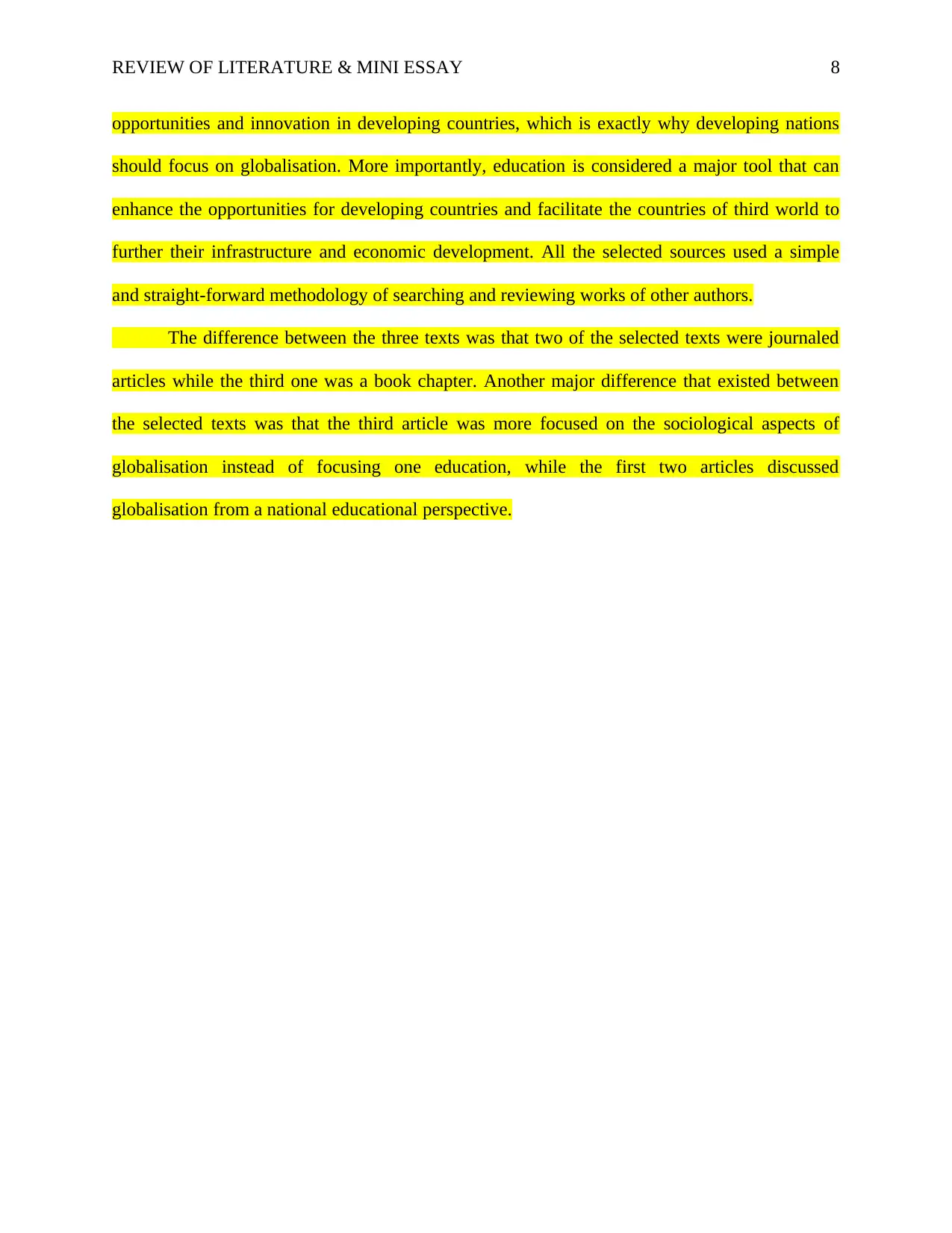
REVIEW OF LITERATURE & MINI ESSAY 8
opportunities and innovation in developing countries, which is exactly why developing nations
should focus on globalisation. More importantly, education is considered a major tool that can
enhance the opportunities for developing countries and facilitate the countries of third world to
further their infrastructure and economic development. All the selected sources used a simple
and straight-forward methodology of searching and reviewing works of other authors.
The difference between the three texts was that two of the selected texts were journaled
articles while the third one was a book chapter. Another major difference that existed between
the selected texts was that the third article was more focused on the sociological aspects of
globalisation instead of focusing one education, while the first two articles discussed
globalisation from a national educational perspective.
opportunities and innovation in developing countries, which is exactly why developing nations
should focus on globalisation. More importantly, education is considered a major tool that can
enhance the opportunities for developing countries and facilitate the countries of third world to
further their infrastructure and economic development. All the selected sources used a simple
and straight-forward methodology of searching and reviewing works of other authors.
The difference between the three texts was that two of the selected texts were journaled
articles while the third one was a book chapter. Another major difference that existed between
the selected texts was that the third article was more focused on the sociological aspects of
globalisation instead of focusing one education, while the first two articles discussed
globalisation from a national educational perspective.
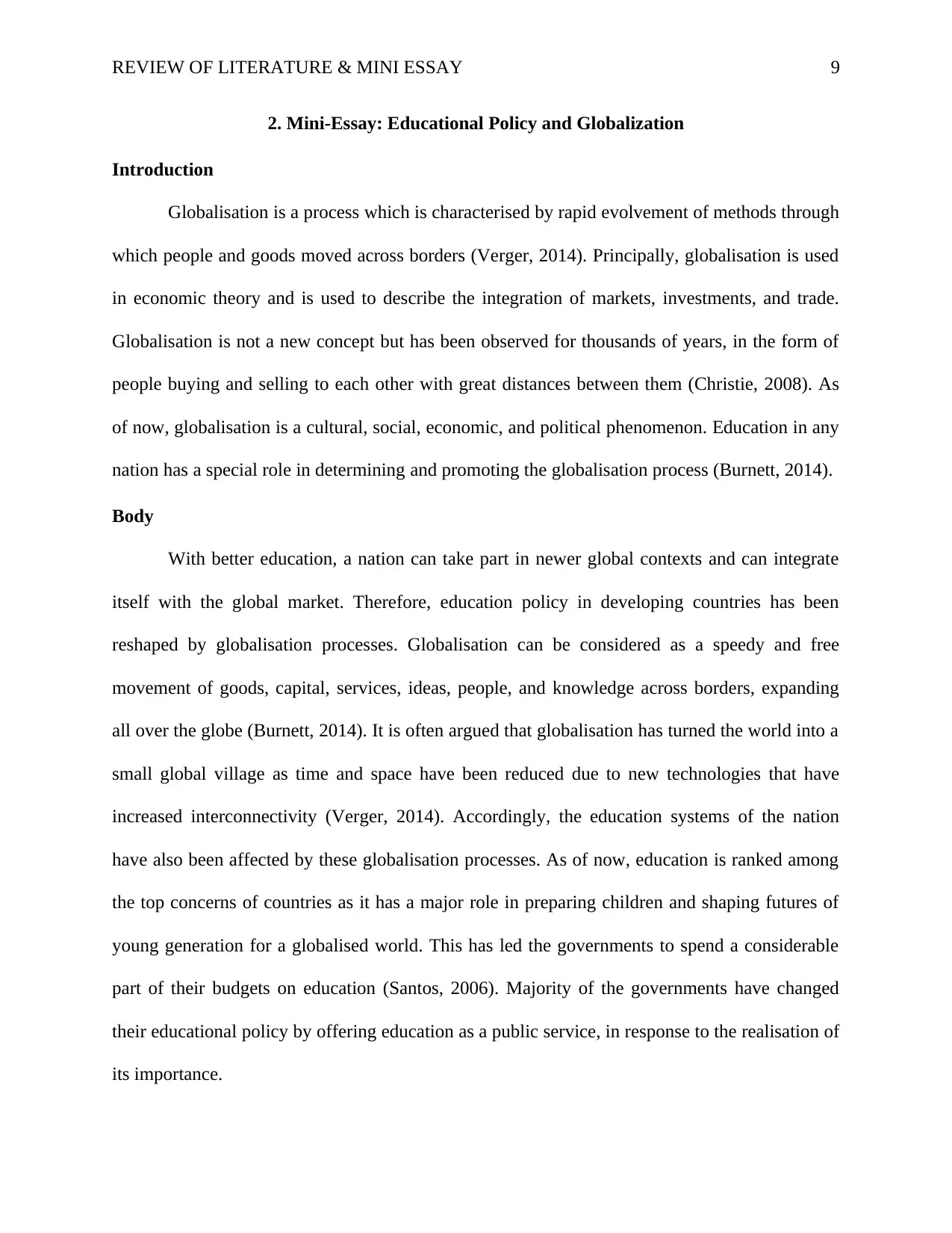
REVIEW OF LITERATURE & MINI ESSAY 9
2. Mini-Essay: Educational Policy and Globalization
Introduction
Globalisation is a process which is characterised by rapid evolvement of methods through
which people and goods moved across borders (Verger, 2014). Principally, globalisation is used
in economic theory and is used to describe the integration of markets, investments, and trade.
Globalisation is not a new concept but has been observed for thousands of years, in the form of
people buying and selling to each other with great distances between them (Christie, 2008). As
of now, globalisation is a cultural, social, economic, and political phenomenon. Education in any
nation has a special role in determining and promoting the globalisation process (Burnett, 2014).
Body
With better education, a nation can take part in newer global contexts and can integrate
itself with the global market. Therefore, education policy in developing countries has been
reshaped by globalisation processes. Globalisation can be considered as a speedy and free
movement of goods, capital, services, ideas, people, and knowledge across borders, expanding
all over the globe (Burnett, 2014). It is often argued that globalisation has turned the world into a
small global village as time and space have been reduced due to new technologies that have
increased interconnectivity (Verger, 2014). Accordingly, the education systems of the nation
have also been affected by these globalisation processes. As of now, education is ranked among
the top concerns of countries as it has a major role in preparing children and shaping futures of
young generation for a globalised world. This has led the governments to spend a considerable
part of their budgets on education (Santos, 2006). Majority of the governments have changed
their educational policy by offering education as a public service, in response to the realisation of
its importance.
2. Mini-Essay: Educational Policy and Globalization
Introduction
Globalisation is a process which is characterised by rapid evolvement of methods through
which people and goods moved across borders (Verger, 2014). Principally, globalisation is used
in economic theory and is used to describe the integration of markets, investments, and trade.
Globalisation is not a new concept but has been observed for thousands of years, in the form of
people buying and selling to each other with great distances between them (Christie, 2008). As
of now, globalisation is a cultural, social, economic, and political phenomenon. Education in any
nation has a special role in determining and promoting the globalisation process (Burnett, 2014).
Body
With better education, a nation can take part in newer global contexts and can integrate
itself with the global market. Therefore, education policy in developing countries has been
reshaped by globalisation processes. Globalisation can be considered as a speedy and free
movement of goods, capital, services, ideas, people, and knowledge across borders, expanding
all over the globe (Burnett, 2014). It is often argued that globalisation has turned the world into a
small global village as time and space have been reduced due to new technologies that have
increased interconnectivity (Verger, 2014). Accordingly, the education systems of the nation
have also been affected by these globalisation processes. As of now, education is ranked among
the top concerns of countries as it has a major role in preparing children and shaping futures of
young generation for a globalised world. This has led the governments to spend a considerable
part of their budgets on education (Santos, 2006). Majority of the governments have changed
their educational policy by offering education as a public service, in response to the realisation of
its importance.
⊘ This is a preview!⊘
Do you want full access?
Subscribe today to unlock all pages.

Trusted by 1+ million students worldwide
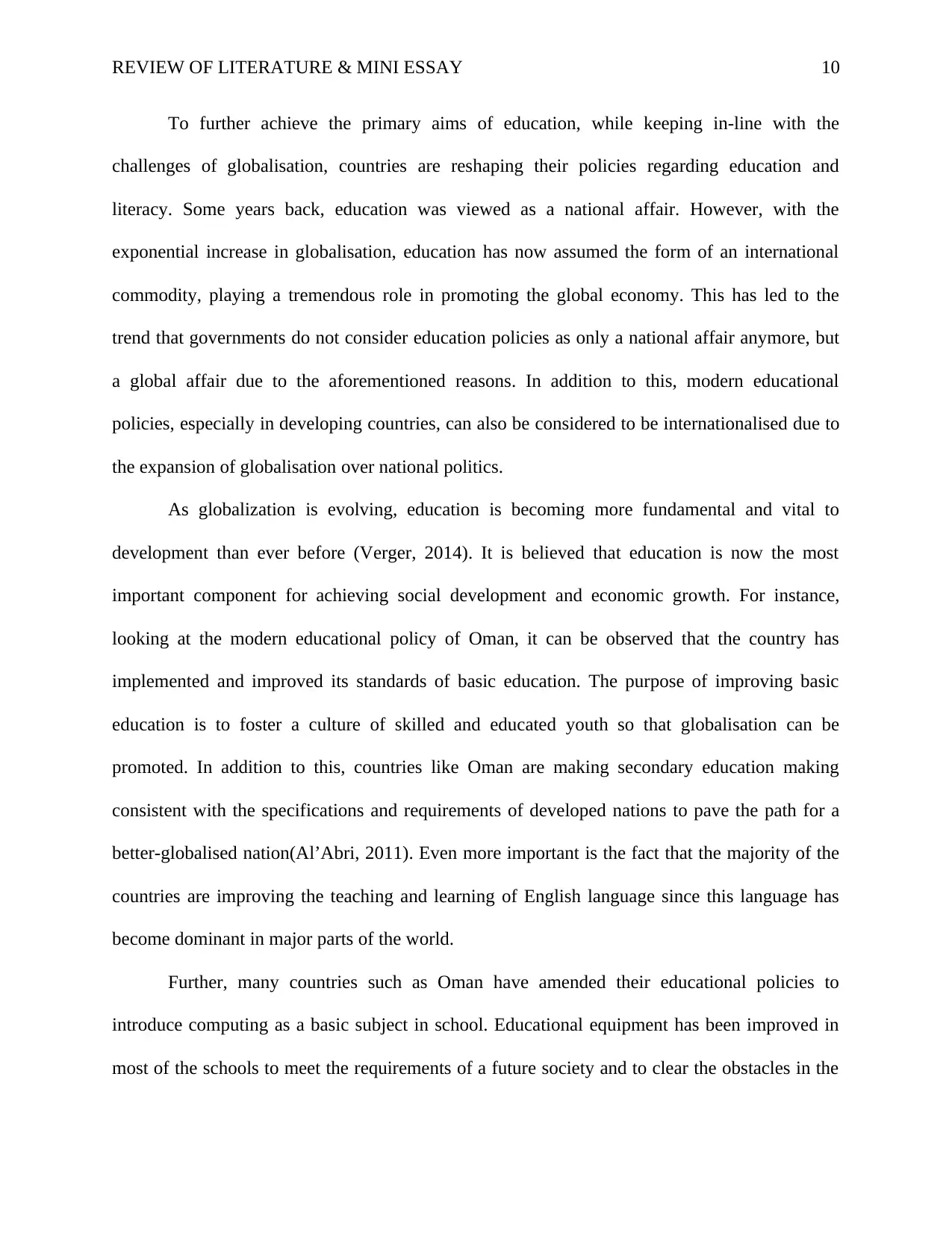
REVIEW OF LITERATURE & MINI ESSAY 10
To further achieve the primary aims of education, while keeping in-line with the
challenges of globalisation, countries are reshaping their policies regarding education and
literacy. Some years back, education was viewed as a national affair. However, with the
exponential increase in globalisation, education has now assumed the form of an international
commodity, playing a tremendous role in promoting the global economy. This has led to the
trend that governments do not consider education policies as only a national affair anymore, but
a global affair due to the aforementioned reasons. In addition to this, modern educational
policies, especially in developing countries, can also be considered to be internationalised due to
the expansion of globalisation over national politics.
As globalization is evolving, education is becoming more fundamental and vital to
development than ever before (Verger, 2014). It is believed that education is now the most
important component for achieving social development and economic growth. For instance,
looking at the modern educational policy of Oman, it can be observed that the country has
implemented and improved its standards of basic education. The purpose of improving basic
education is to foster a culture of skilled and educated youth so that globalisation can be
promoted. In addition to this, countries like Oman are making secondary education making
consistent with the specifications and requirements of developed nations to pave the path for a
better-globalised nation(Al’Abri, 2011). Even more important is the fact that the majority of the
countries are improving the teaching and learning of English language since this language has
become dominant in major parts of the world.
Further, many countries such as Oman have amended their educational policies to
introduce computing as a basic subject in school. Educational equipment has been improved in
most of the schools to meet the requirements of a future society and to clear the obstacles in the
To further achieve the primary aims of education, while keeping in-line with the
challenges of globalisation, countries are reshaping their policies regarding education and
literacy. Some years back, education was viewed as a national affair. However, with the
exponential increase in globalisation, education has now assumed the form of an international
commodity, playing a tremendous role in promoting the global economy. This has led to the
trend that governments do not consider education policies as only a national affair anymore, but
a global affair due to the aforementioned reasons. In addition to this, modern educational
policies, especially in developing countries, can also be considered to be internationalised due to
the expansion of globalisation over national politics.
As globalization is evolving, education is becoming more fundamental and vital to
development than ever before (Verger, 2014). It is believed that education is now the most
important component for achieving social development and economic growth. For instance,
looking at the modern educational policy of Oman, it can be observed that the country has
implemented and improved its standards of basic education. The purpose of improving basic
education is to foster a culture of skilled and educated youth so that globalisation can be
promoted. In addition to this, countries like Oman are making secondary education making
consistent with the specifications and requirements of developed nations to pave the path for a
better-globalised nation(Al’Abri, 2011). Even more important is the fact that the majority of the
countries are improving the teaching and learning of English language since this language has
become dominant in major parts of the world.
Further, many countries such as Oman have amended their educational policies to
introduce computing as a basic subject in school. Educational equipment has been improved in
most of the schools to meet the requirements of a future society and to clear the obstacles in the
Paraphrase This Document
Need a fresh take? Get an instant paraphrase of this document with our AI Paraphraser
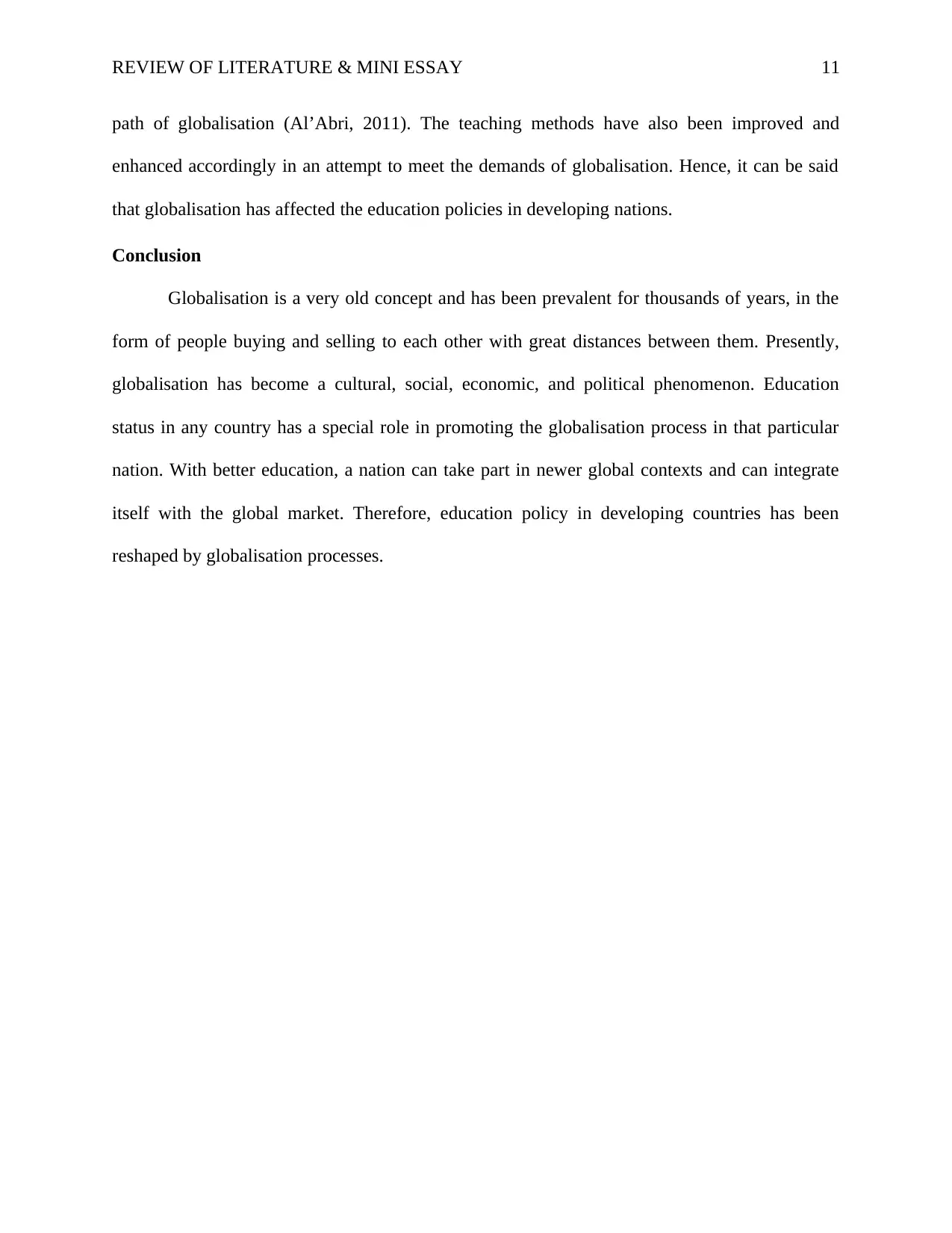
REVIEW OF LITERATURE & MINI ESSAY 11
path of globalisation (Al’Abri, 2011). The teaching methods have also been improved and
enhanced accordingly in an attempt to meet the demands of globalisation. Hence, it can be said
that globalisation has affected the education policies in developing nations.
Conclusion
Globalisation is a very old concept and has been prevalent for thousands of years, in the
form of people buying and selling to each other with great distances between them. Presently,
globalisation has become a cultural, social, economic, and political phenomenon. Education
status in any country has a special role in promoting the globalisation process in that particular
nation. With better education, a nation can take part in newer global contexts and can integrate
itself with the global market. Therefore, education policy in developing countries has been
reshaped by globalisation processes.
path of globalisation (Al’Abri, 2011). The teaching methods have also been improved and
enhanced accordingly in an attempt to meet the demands of globalisation. Hence, it can be said
that globalisation has affected the education policies in developing nations.
Conclusion
Globalisation is a very old concept and has been prevalent for thousands of years, in the
form of people buying and selling to each other with great distances between them. Presently,
globalisation has become a cultural, social, economic, and political phenomenon. Education
status in any country has a special role in promoting the globalisation process in that particular
nation. With better education, a nation can take part in newer global contexts and can integrate
itself with the global market. Therefore, education policy in developing countries has been
reshaped by globalisation processes.
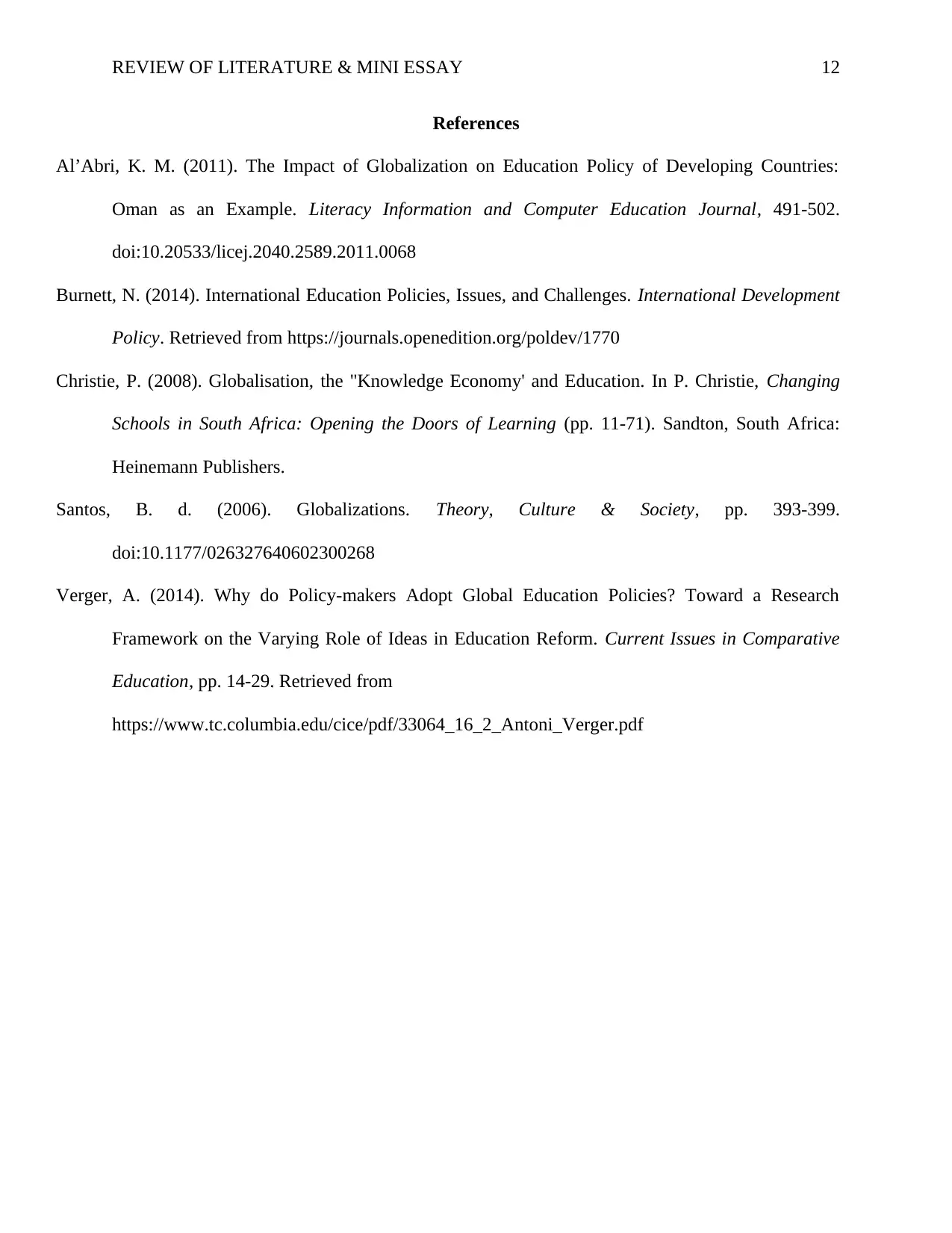
REVIEW OF LITERATURE & MINI ESSAY 12
References
Al’Abri, K. M. (2011). The Impact of Globalization on Education Policy of Developing Countries:
Oman as an Example. Literacy Information and Computer Education Journal, 491-502.
doi:10.20533/licej.2040.2589.2011.0068
Burnett, N. (2014). International Education Policies, Issues, and Challenges. International Development
Policy. Retrieved from https://journals.openedition.org/poldev/1770
Christie, P. (2008). Globalisation, the "Knowledge Economy' and Education. In P. Christie, Changing
Schools in South Africa: Opening the Doors of Learning (pp. 11-71). Sandton, South Africa:
Heinemann Publishers.
Santos, B. d. (2006). Globalizations. Theory, Culture & Society, pp. 393-399.
doi:10.1177/026327640602300268
Verger, A. (2014). Why do Policy-makers Adopt Global Education Policies? Toward a Research
Framework on the Varying Role of Ideas in Education Reform. Current Issues in Comparative
Education, pp. 14-29. Retrieved from
https://www.tc.columbia.edu/cice/pdf/33064_16_2_Antoni_Verger.pdf
References
Al’Abri, K. M. (2011). The Impact of Globalization on Education Policy of Developing Countries:
Oman as an Example. Literacy Information and Computer Education Journal, 491-502.
doi:10.20533/licej.2040.2589.2011.0068
Burnett, N. (2014). International Education Policies, Issues, and Challenges. International Development
Policy. Retrieved from https://journals.openedition.org/poldev/1770
Christie, P. (2008). Globalisation, the "Knowledge Economy' and Education. In P. Christie, Changing
Schools in South Africa: Opening the Doors of Learning (pp. 11-71). Sandton, South Africa:
Heinemann Publishers.
Santos, B. d. (2006). Globalizations. Theory, Culture & Society, pp. 393-399.
doi:10.1177/026327640602300268
Verger, A. (2014). Why do Policy-makers Adopt Global Education Policies? Toward a Research
Framework on the Varying Role of Ideas in Education Reform. Current Issues in Comparative
Education, pp. 14-29. Retrieved from
https://www.tc.columbia.edu/cice/pdf/33064_16_2_Antoni_Verger.pdf
⊘ This is a preview!⊘
Do you want full access?
Subscribe today to unlock all pages.

Trusted by 1+ million students worldwide
1 out of 12
Related Documents
Your All-in-One AI-Powered Toolkit for Academic Success.
+13062052269
info@desklib.com
Available 24*7 on WhatsApp / Email
![[object Object]](/_next/static/media/star-bottom.7253800d.svg)
Unlock your academic potential
Copyright © 2020–2025 A2Z Services. All Rights Reserved. Developed and managed by ZUCOL.





